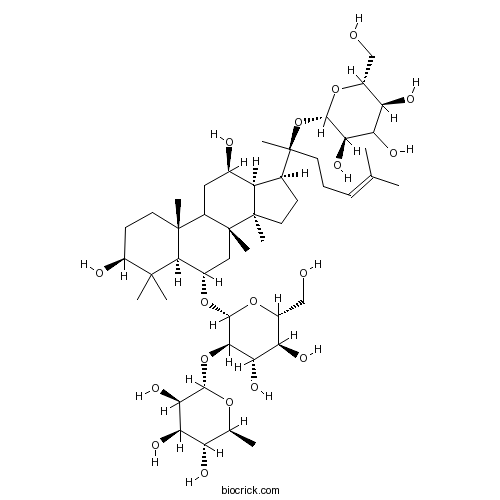A ginsenoside found in Panax ginseng that is dammarane which is substituted by hydroxy groups at the 3β, 6α, 12β and 20 pro-S positions, in which the hydroxy groups at positions 6 and 20 have been converted to the corresponding α-L-rhamnopyranosyl-(1→2)-β-D-glucopyranoside and β-D-glucopyranoside respectively, and in which a double bond has been introduced at the 24-25 position.
InChI=1S/C48H82O18/c1-21(2)11-10-14-48(9,66-42-38(60)35(57)32(54)26(19-49)63-42)23-12-16-46(7)30(23)24(51)17-28-45(6)15-13-29(52)44(4,5)40(45)25(18-47(28,46)8)62-43-39(36(58)33(55)27(20-50)64-43)65-41-37(59)34(56)31(53)22(3)61-41/h11,22-43,49-60H,10,12-20H2,1-9H3/t22-,23-,24+,25-,26+,27+,28?,29-,30+,31-,32+,33+,34+,35?,36-,37+,38+,39+,40-,41-,42-,43+,45+,46+,47+,48-/m0/s1
Ginsenoside Re, a main phytosterol of Panax ginseng, inhibits Ca(2+) accumulation in mitochondria during cardiac ischemia/reperfusion, which is attributable to nitric oxide (NO)-induced Ca(2+) channel inhibition and K(+) channel activation in cardiac myocytes, acts as a specific agonist for the nongenomic pathway of sex steroid receptors, and NO released from activated eNOS underlies cardiac K(+) channel activation and protection against ischemia-reperfusion injury, G-Re also exerts antiischemic effect and induces angiogenic regeneration.[1,2]
Ginsenoside Re has anti-diabetic and anti-hyperlipidemic activities ,can improve hyperglycemia and hyperlipidemia through activation of AMPK, and confer beneficial effects on type 2 diabetic patients with insulin resistance and dyslipidemia. [3]
Ginsenoside Re can improve the cognition of streptozotocin-induced diabetic rats,the mechanism is by its anti-inflammation and antioxidation; glycemic control benefits the attenuation of diabetes-associated cognitive decline.[4]
Ginsenoside Re can hyperpolarize HCAECs,and this effect can be reversed by apamin, suggests ginsenoside Re increases HCAEC outward current via SKCa channel activation, and NSC channel is not involved.[5]
Ginsenoside Re increases the proliferation of CD4 + T cells with decreases cell death, and enhances viability of CD4 + T cells through the regulation of IFN-γ-dependent autophagy activity.[6]
Ginsenoside Re exhibits potent neuroprotective effects against neuroinflammation in a murine model of ALS, ginsenoside Re treatment can reduce the loss of motor neurons and active-microglia-related expression of Iba-1 in the spinal cord of symptom.[7]
English website: Ginsenoside Re
Japanese website: Ginsenoside Re
Chinese website: Ginsenoside Re
[1] Furukawa T, Bai C X, Kaihara A, et al. Mol Pharmacol, 2006, 70(6):1916-24.
[2] Peng L, Sun S, Xie L H, et al. Cardiovasc Ther , 2012, 30(4):e183–e188.
[3] Quan H Y, Yuan H D, Jung M S, et al. Int J of Mol Med, 2012, 29(1):73-80.
[4] Liu Y W, Zhu X, Li W, et al. Pharmacol Biochem, 2012, 101(1):93-98.
[5] Sukrittanon S, Watanapa W B, Ruamyod K. Life Sci, 2014, 115(1–2):15-21.
[6] Son Y M, Kwak C W, Lee Y J, et al. Int Immunopharmaco, 2010, 10(5):626-631.
[7] Cai M, Yang E J. Am J Chinese Med, 2016, 44(2):401-413.
[8] Huang X, Liang T. Chinese Medicine Modern Distance Education of China, 2011, 09(21):131-132.



